
Lewis Brian Hopkin Jones was an English musician and founder of the Rolling Stones. Initially a slide guitarist, he went on to sing backing vocals and played a wide variety of instruments on Rolling Stones recordings and in concerts.

Keith Richards is an English musician, songwriter, singer and record producer who is an original member, guitarist, secondary vocalist, and co-principal songwriter of the Rolling Stones. His songwriting partnership with the band's lead vocalist Mick Jagger is one of the most successful in history. His career spans over six decades, and his guitar playing style has been a trademark of the Rolling Stones throughout the band's career. Richards gained press notoriety for his romantic involvements and illicit drug use, and he was often portrayed as a countercultural figure. First professionally known as Keith Richard, by the early 1970s he had fully asserted his family name.

Blondes Have More Fun is British musician Rod Stewart's ninth album, released in November 1978. As was the popular musical trend at the time, it is Stewart's foray into disco music. The album was commercially successful, reaching number 3 in the UK and number 1 in the US, but was critically divisive. The lead single "Da Ya Think I'm Sexy" became one of Stewart's biggest hits, peaking at No.1 in both the UK and US.

Ronald David Wood is an English rock musician, best known as an official member of the Rolling Stones since 1975, as well as a member of Faces and the Jeff Beck Group.
Anita Pallenberg was an Italian-German actress, artist, and model. A style icon and "It Girl" of the 1960s and 1970s, Pallenberg was credited as the muse of the Rolling Stones: she was the romantic partner of the Rolling Stones founder, multi-instrumentalist Brian Jones, and later, from 1967 to 1980, the partner of Stones guitarist Keith Richards, with whom she had three children.
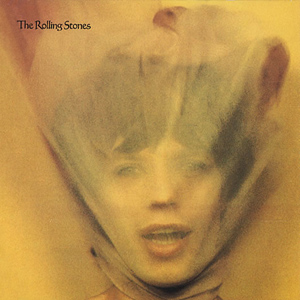
Goats Head Soup is a studio album by the English rock band the Rolling Stones, released on 31 August 1973 by Rolling Stones Records. Like its predecessor Exile on Main St., the band composed and recorded much of it outside of the United Kingdom due to their status as tax exiles. Goats Head Soup was recorded in Jamaica, the United States and the United Kingdom. The album contains 10 tracks, including the lead single "Angie" which went to number one as a single in the US and the top five in the UK.
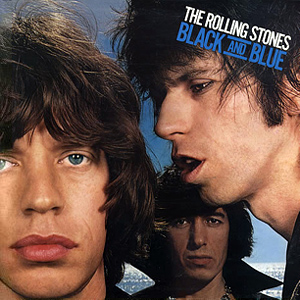
Black and Blue is the thirteenth studio album by the English rock band the Rolling Stones, released on 23 April 1976 by Rolling Stones Records.

Some Girls is the fourteenth studio album by the English rock band the Rolling Stones, released on 9 June 1978 by Rolling Stones Records. It was recorded in sessions held from October 1977 to February 1978 at Pathé Marconi Studios in Paris and produced by the band's chief songwriters – lead vocalist Mick Jagger and guitarist Keith Richards – with Chris Kimsey engineering the recording.

Aftermath is a studio album by the English rock band the Rolling Stones. The group recorded the album at RCA Studios in California in December 1965 and March 1966, during breaks between their international tours. It was released in the United Kingdom on 15 April 1966 by Decca Records and in the United States in late June or early July 1966 by London Records. It is the band's fourth British and sixth American studio album, and closely follows a series of international hit singles that helped bring the Stones newfound wealth and fame rivalling that of their contemporaries the Beatles.
Crawdaddy was an American rock music magazine launched in 1966. It was created by Paul Williams, a Swarthmore College student at the time, in response to the increasing sophistication and cultural influence of popular music. The magazine was named after the Crawdaddy Club in London and published during its early years as Crawdaddy!.

"Ruby Tuesday" is a song recorded by the Rolling Stones in 1966, released in January 1967. The song became the band's fourth number-one hit in the United States and reached number three in the United Kingdom as a double A-side with "Let's Spend the Night Together". The song was included in the American version of Between the Buttons.
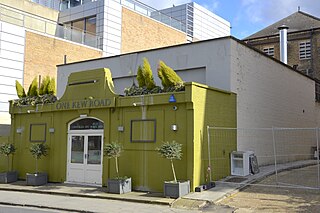
The Crawdaddy Club was a music venue in Richmond, Surrey, England, which opened in 1963. The Rolling Stones were its house band in its first year and were followed by The Yardbirds. Several other notable British blues and rhythm and blues acts also played there.

"Mother's Little Helper" is a song by the English rock band the Rolling Stones. A product of Mick Jagger and Keith Richards' songwriting partnership, it is a folk rock song with Eastern influences. Its lyrics deal with the popularity of prescribed tranquilisers like Valium among housewives and the potential hazards of overdose or addiction. Recorded in December 1965, it was first released in the United Kingdom as the opening track of the band's April 1966 album, Aftermath. In the United States, it was omitted from the album and instead issued as a single in July 1966 during the band's fifth American tour. The Rolling Stones' twelfth US single, "Mother's Little Helper" spent nine weeks on the US Billboard Hot 100, peaking at No. 8, and it reached No. 4 on both Record World and Cash Box's charts.
"Sweet Virginia" is a song written by Mick Jagger and Keith Richards, and was the sixth song on the Rolling Stones' 1972 double album Exile on Main St. The song is a slow country-inspired composition with a saxophone solo.

"Emotional Rescue" is a song by the English rock and roll band, the Rolling Stones. It was written by Mick Jagger and Keith Richards and is included on their 1980 album Emotional Rescue.
Kris Needs is a British journalist and author, known for writings on music from the 1970s onwards. He became editor of proto-punk and early punk rock ZigZag magazine in August 1977 at 23 and has since written biographies of musicians and rock stars, including Primal Scream, Joe Strummer and Keith Richards.
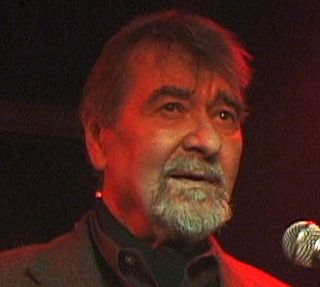
Giorgio Sergio Alessando Gomelsky was a filmmaker, impresario, music manager, songwriter and record producer. He was born in Georgia, grew up in Switzerland, and later lived in the United Kingdom and the United States.
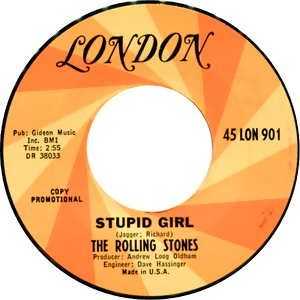
"Stupid Girl" is a song recorded by the English rock band the Rolling Stones. Written by Mick Jagger and Keith Richards, the song featured on the band's 1966 album Aftermath. It was also issued as the B-side of the U.S. "Paint It Black" single.

"Mandolin Wind" is a song written by Rod Stewart. It was first released on Stewart's 1971 album Every Picture Tells a Story and later as the B-side of a single from that album, his version of "(I Know) I'm Losing You." Mercury Records issued the song as a 7-inch single in mid-1977. It has also appeared on numerous Rod Stewart compilation and live albums, including Sing It Again Rod, Storyteller – The Complete Anthology: 1964–1990 and Unplugged...and Seated.

KRLA Beat was an American rock music magazine that operated between 1964 and 1968. It began in October 1964 as a free newsletter distributed by the Southern Californian radio station KRLA, before being reworked as a more reportage-focused title in February 1965. The music journalism archive Rock's Backpages describes KRLA Beat as "the first American newspaper dedicated to coverage of the top-forty rock-and-roll music scene".
















